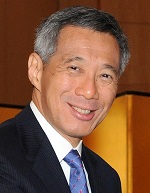 |
| Singapore Prime Minister Lee Hsien Loong |
SINGAPORE--The wealthy city-state of Singapore has decided to offer a form of universal health coverage, Prime Minister Lee Hsien Loong said at a Tuesday meeting. The plan would extend catastrophic and polyclinic care already offered at subsidized rates, under catastrophic medical care now available under the country's Central Provident Fund.
"In Singapore, we face the same challenges and difficulties as other societies when delivering good healthcare, because these are intrinsic to the healthcare business. We have developed our own approach, which works well for us," Lee told the audience at a meeting on universal health coverage. World Health Organisation Director-General Margaret Chan and Singapore Health Minister Gan Kim Yong were among those in attendance.
Neighboring Indonesia launched a phased-in program of universal healthcare coverage at the start of 2014. Like other Southeast Asian nations such as Malaysia and Thailand, Indonesia plans to cover basic care and many prescription drugs. Nearby Australia and New Zealand offer more elaborate reimbursement offerings.
Singapore has used a mix of private and public insurance to cover most citizens, and subsidizes some care, such as vaccinations on the WHO list. Under the new proposal, the country would make inoculation compulsory, among other changes. The plan seeks "to marry the best of a privatised healthcare system with that of a single-payer system," Lee said.
 This means government hospitals will be restructured to become autonomous, non-profit entities with official subsidies. The subsidies would be supplemented by compulsory savings. An opt-out catastrophic coverage plan, MediShield, would be replaced by MediShield Life, which all Singaporeans would be required to participate in. The new scheme will "give better protection from growing bill sizes," Lee said.
This means government hospitals will be restructured to become autonomous, non-profit entities with official subsidies. The subsidies would be supplemented by compulsory savings. An opt-out catastrophic coverage plan, MediShield, would be replaced by MediShield Life, which all Singaporeans would be required to participate in. The new scheme will "give better protection from growing bill sizes," Lee said.
Lee added that the government is "very mindful" of the risk of excessive healthcare spending and that costs are "bound to grow" as a necessary consequence of ensuring affordable healthcare for all.
"There will be political pressure to defer necessary fee increases. It would be easy to leave bills to the next generation and focus on the short-term political gain," he said. "If we succumb to this temptation, we will end up with system which becomes non-viable, and will hurt Singaporeans not just financially, but even purely in health terms.
- here's the speech
Related Stories:
Bupa International Releases Health Guides to Hong Kong and Singapore
Singapore to detail trial of MicroVAX novel cancer vaccine
Emerging Asian pharma markets poised to show solid growth in 2015: report
Novartis CEO Jimenez says China is a difficult market, but worth it